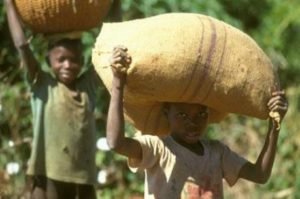Ghana ranks 38th on Global Slavery Index 2018
 Ghana is ranked 38th, with estimated 1.1 million adults said to be in forced labour in cocoa growing areas in the country, according to the 2018 Global Slavery Index.
Ghana is ranked 38th, with estimated 1.1 million adults said to be in forced labour in cocoa growing areas in the country, according to the 2018 Global Slavery Index.
The report which was conducted between 2016 and 2017 found that, for every 1,000 adult cocoa workers in medium and high cocoa growing areas, an estimated 3.3 per cent were victims of forced labour between 2013 and 2017.
The number corresponds to approximately 3,700 adult victims who were in forced labour in cocoa growing communities at that time.
The findings also suggest that, for every 1,000 children who were working in cocoa agriculture in areas of medium and high cocoa production, an approximate 1.5 were victims of forced child labour at the hands of someone outside the family in the the period under review.
In line with the International Labour Organization’s (ILO) criteria for forced labour of children, when including those who had been forced to work in cocoa agriculture by someone other than their parents, this estimate increased to 20 children in child labour per 1,000 children in cocoa working agriculture between 2013 and 2017.
According to the Index, out of the estimated 708,000 children between ages 10 and 17 years who worked on cocoa agriculture in medium and high cocoa producing areas in Ghana between August 2016 and August 2017, over 94 per cent or approximately 668,000 experienced child labour.
Child labour according to the report is, “children performing hazardous labour in the previous 12 months, exceeding maximum allowable working hours for children their age in the previous week, or both.”
The Index also indicated that, participants who reported hazardous work, 81 per cent reported carrying heavy loads and 71 per cent reported using sharp tools.
It reports that on any given day in 2016, an estimated 9.2 million men, women, and children were living in modern slavery in Africa. The region has the highest rate of prevalence, with 7.6 people living in modern slavery for every 1,000 people in the region.
When considering the forms of modern slavery, the rate of forced marriage (4.8 victims per 1,000 people in the region) was higher than the rate of forced labour (2.8 victims per 1,000 people in the region), it added.
Over half of all victims of forced labour exploitation (54 percent) were held in debt bondage, with similar proportions of men and women in the region trapped through debt. An estimated 400,000 people in the region were victims of forced sexual exploitation, accounting for eight percent of all victims of forced sexual exploitation and commercial sexual exploitation of children worldwide.
Within the Africa region, Eritrea, Burundi, and Central African Republic were the countries with the highest prevalence of modern slavery, however, Nigeria and the Democratic Republic of Congo have the highest absolute number, and accounted for over one quarter (26.3 per cent) of all victims in the region.
The report said, “These regional figures, while important, should be interpreted cautiously given the gaps and limitations of data in certain countries.”
North Korea according to the report, has the highest prevalence of modern slavery in the world.
“Overall, our findings confirm that modern slavery remains a critical issue for all countries. Just as responding to environmental concerns cannot be the task of one country alone, responding to modern slavery is a challenge that requires commitment and effort from all countries”.
“An analysis of the national estimates in this Global Slavery Index confirms that modern slavery is a crime that affects all countries globally, including, perhaps surprisingly, highly developed countries. While an understanding of prevalence is critical to formulating sound policy responses to modern slavery, equally important is building our understanding of what is driving prevalence”, the report said.
By: Asabea Akonor & Gifty Danso
Copyright ©2019 by Creative Imaginations Publicity
All rights reserved. This article or any portion thereof may not be reproduced or used in any manner whatsoever without the express written permission of the publisher except for the use of brief quotations in reviews.
